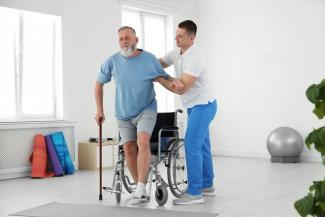
Rehabilitation is essential and critical to improved quality of life and recovery for a stroke patient. Experienced Physiotherapists Nicole D’souza and Kshitija Ghole from the Neurology Foundation address some of the common questions on stroke rehabilitation.
1. What is the aim of stroke rehabilitation?
The aim of Stroke rehabilitation is to help those affected to relearn essential skills lost due to damage to the brain. These could range from re-learning how to walk again, using your hand, speaking and performing daily activities. It aims to empower the person to live his/her life as independently as possible.
2. What is most recommended: rest or rehabilitation after in the initial days after a stroke?
After a stroke, once the patient is medically stable the doctor in-charge will recommend rehabilitation at the earliest. It is important for the patient to come to the upright position or start moving as early as possible to enable a better and quicker recovery.
Related Reading: Stroke Rehab Helps Relearn Lost Skills
3. What does rehabilitation involve?
A person with stroke may suffer from a number of difficulties ranging from difficulties with movement to difficulties with speech, cognition etc. Thus a multidisciplinary approach is important when managing a person with stroke. This may involve physiotherapy, speech therapy, cognitive therapy, counselling, diet and nutrition, dance therapy, music therapy, art therapy, yoga etc based on ones needs.
Physiotherapy rehabilitation involves stretching exercises, strengthening exercises, mobility exercises, balance training, co-ordination exercises, gait training. There are advanced therapies also such as aqua-therapy, treadmill training, virtual rehabilitation, robotics that are also being used in rehabilitation. These exercises help to reduce spasticity, improve mobility, improve walking pattern and increasing functional independence.
4. Rehabilitation at home vs hospital, what are pros and cons of each?
Rehabilitation plays a crucial role in improving a person's life after a stroke. The quality of rehabilitation is more important than the place where it is taking place. In a hospital a variety of equipments are available for rehabilitation which may not be available at the home. At the same time it is important to consider the home environment while rehabilitating a person in a hospital setup so that any barriers in the home environment can be modified.
5. What are some ways to motivate patients?
The motivation of the patient towards participating in rehabilitation is one of the most important factors for recovery. Talking to the patient, understanding their interests, likes and dislikes, including the patient and the family in decision making and setting goals are some of the ways in which to motivate the patient. During the course of rehabilitation showing them small improvements can also serve as motivation to continue with the rehab. For those who may be suffering from depression, group therapy or counselling will help them improve their mood and increase their motivation.
6. Have you found any complementary therapies to be helpful?
Following medications and physiotherapy exercises are important part of rehabilitation process. Along with that complementary therapies which are found to be helpful are Music therapy, Dance and Movement therapy, Virtual rehabilitation, Yoga, Art therapy, Graded Motor Imagery etc.
7. How long must rehabilitation be continued?
After a stroke, initially rehabilitation is required to relearn lost skills and get back to daily activities. However appropriate rehabilitation must continue lifelong to maintain the effects of the therapy and to prevent further strokes by keeping blood pressure, diabetes and cholesterol in check.
8. What specialists are required for rehabilitation? What is the role of each specialist?
Neurophysicians are usually the leaders of the rehabilitation team. They diagnose, monitor and prescribe medications. Other members of the rehabilitation team are Physiotherapists who deal with movement related concerns, Occupational therapists who help to reintegrate the person back in to the home and work environment, speech therapists who deal with speech, swallowing and communication issues. There may also be need for vision related exercises. Psychologists help in dealing with emotional and cognitive issues. Nutritionists and dieticians provide advice on diet and nutrition.
9. What factors are important for the patient's recovery?
A person's recovery is dependent on a number of factors such as:
- area of the brain affected
- type of stroke & severity
- genetic factors.
- socio-demographic factors like age, gender, socioeconomic status, and family support.
Nicole D'souza - Masters in Neurological Physiotherapy, Head of therapy & Research at Neurology Foundation
Kshitija Ghole - Masters in Physiotherapy, Therapist at Neurology Foundation





